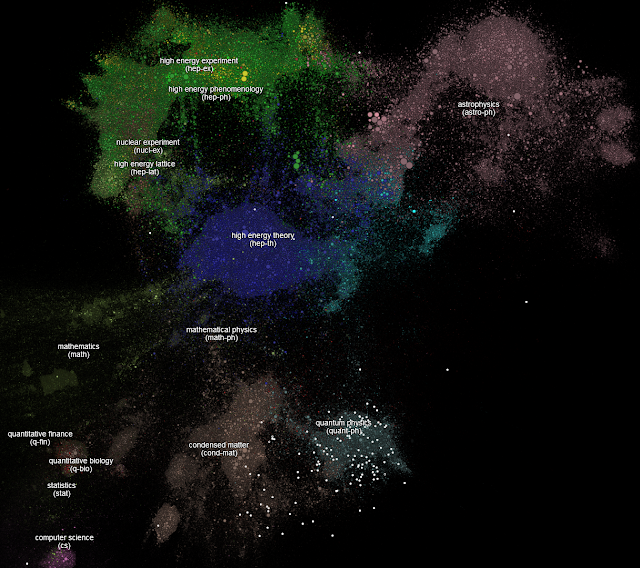Hello to you and welcome to my blog! This is my first (actual) post here and I would like to start by telling you why I want to write about this particular topic. Like it says in the title, this blog is about physics and math, with an emphasis on photonics, so I will be writing about a large variety of things but keep coming back to that one special topic.
I will not be talking (at least not too much) about the topics that are the most popular (and maybe the most controversial) in science, such as string theory, quantizing gravity or about the search for a theory of everything. Why, then, do I want to tell people about photonics? As you may have guessed, it is because I actually am qualified to talk about it, since it is my main area of expertise and I happen to have a formal education in it.
 |
|
| The arXiv universe! The white dots are papers on optics, notice where they are centered? (paperscape.org) |
|
The way I came to do this line of work is rather unconventional. When I was in school I wasn't particularly interested in studying, and did the bare minimum to get acceptable grades. Most of the time I did my homeworks on the break before class and didn't bother to open any books on my free time. Then, as time went by (like it usually does), there came a day when I had to choose what I wanted to do with my life. I wasn't at all certain, so I chose something I thought would give me a broad background for pretty much everything, and started studying physics.
Beginning my studies at the University of Eastern Finland was a rude wake up call, as I realized that the bare minimum of effort was not nearly enough at this level anymore. I barely made it through the first year, but I worked really hard to make it.
Then, during the summer vacation between my first and second year, something physically changed in my brain - or at least it felt like that. I adopted a whole new way of looking at the world, and for the first time ever, I felt the thirst for knowledge. Physics became my hobby, and studying, calculating or thinking no longer felt like the necessary evil. The better I got at physics, the more accomplished I felt. I had found my motivation.
Having graduated as a Bachelor of Science, I moved on to the Master's program of my university, which happened to be about photonics (the Bachelor's covered a much broader area of physics). That was one of those "sure, why not" -moments, because I had only a vaque idea of what I should expect, and I wasn't particularly inclined to any single area of physics.
Now, having completed my Master's and after working in the field for a few years, I must say that boy, was I lucky! The field of photonics is extremely interesting, and very active, even outside the academia. There are several ideas in photonics that are not very well know by the general public, but they affect everyones lives on a daily basis. I will be talking about these topics in the upcoming (hopefully many) posts.
As for the impact and importance of photonics as an area of research, I think Professor Rick Trebino said it best: "
The vast
majority of science's greatest discoveries have resulted directly from more
powerful light-measurement devices."
This might seem difficult to swallow at first, but it is undoubtedly true. Research in photonics and optics has given us ways to see unfathomably large structures in the sky and microscopes made the world of microbes visible to the human eye. The Michelson-Morley experiment paved the way for relativity, and
spectroscopy lead to quantum mechanics.
More importantly for you, mass producing smart phones and computers would not be possible without photonics, because their production relies on
optical lithography. Also, the internet wouldn't exist, because it is based on optical pulses traveling in optical fibers.
 |
| The amount of research in photonics and optics is staggering, and as you can see, the number of publications per year in this area is rapidly increasing. (webofknowledge.com, data for 2017 is still incomplete.) |
From the academic point of view, photonics seems almost mythical as a research area. In addition to being the breeding ground for ground breaking theories, it also produces more Nobel Prize winners than any other field! For example, the 2014 Nobel Prizes in physics AND in chemistry were awarded to research done in
photonics. And this year, the Nobel Prize in physics went to the
LIGO experiment which is basically a devastatingly huge optical interferometer.
Long story short, I want to write about science that affects every single one of us on a daily basis. In my opinion these topics have been receiving far too little attention from the general public. Hopefully this will be of interest to someone else as well!



Comments
Post a Comment